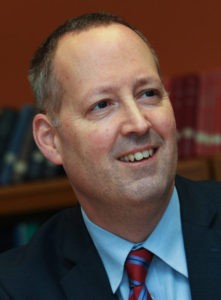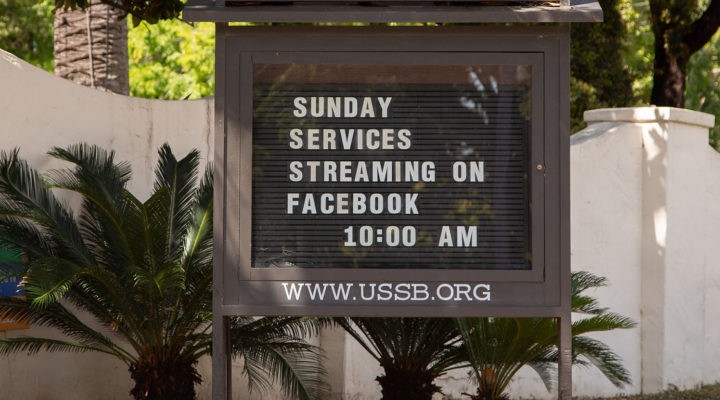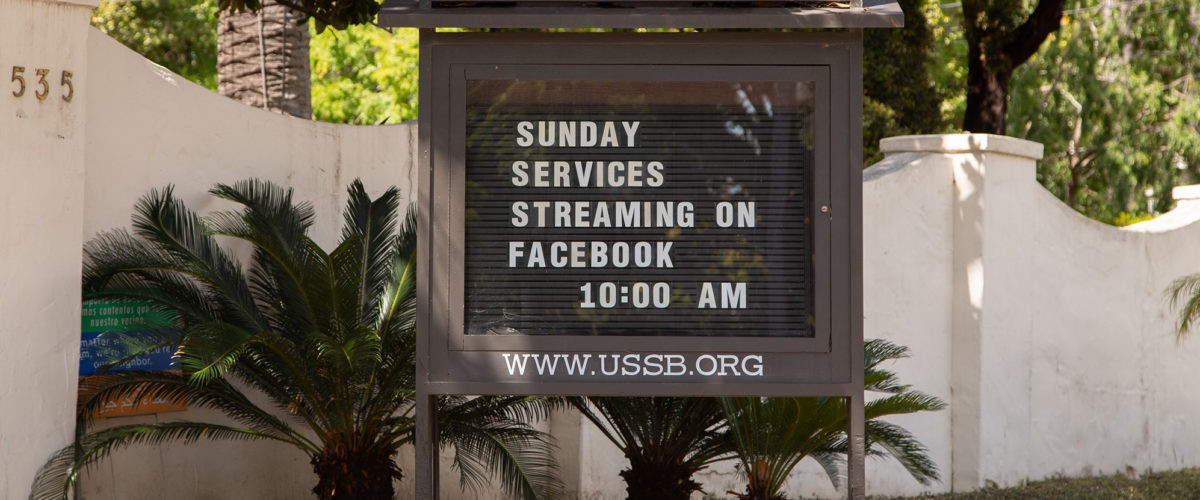This summer, Elizabeth Dias, who covers faith and politics for the New York Times, wrote an article titled “Facebook’s Next Target: The Religious Experience.” Published July 25, it chronicled Facebook’s efforts to partner with a wide range of faith communities from individual congregations to large denominations.
“Facebook created its faith partnerships team in 2017 and began courting religious leaders, especially of evangelical and Pentecostal groups, in earnest in 2018,” Dias wrote. The specifics of this effort and the products under development remain unclear due to nondisclosure agreements.

Curtis Ramsey-Lucas
What is clear is that Facebook “aims to become the virtual home for religious community and wants churches, mosques, synagogues and others to embed their religious life into its platform, from hosting worship services and socializing more casually to soliciting money,” Dias said.
Earlier this year, Facebook executives pitched their efforts to religious groups at an online summit. Sheryl Sandberg, the company’s chief operating officer, shared an online resource hub with tools to build congregations on the platform.
“Faith organizations and social media are a natural fit because fundamentally both are about connection,” Sandberg said, according to Dias’ reporting.
Fast-forward to October and the revelations of former Facebook employee Frances Haugen. Through documents provided to the Wall Street Journal, an interview with “60 Minutes,” and testimony to Congress, Haugen painted a picture of Facebook prioritizing self-interest — especially profits — over what is good for the public.
In her testimony to Congress, the 37-year-old data scientist said she encountered abundant evidence that Facebook knew its products and services caused political harm to democracies by spreading misinformation and emotional harm to teenagers by encouraging competition for “likes” and comments.
The key to Haugen’s revelations, according to University of Virginia media studies professor Siva Vaidhyanathan, is that “top Facebook leaders knew that, internally, all their data and studies supported what critics like me have been saying for more than a decade: The problems that Facebook amplifies are not easy — or even possible — to fix as long as the company continues to run on its founding principles, that maximizing users, growth and engagement are paramount and supersede all other values.”
In an interview in UVA Today, Vaidhyanathan said, “Facebook is all about generating more Facebook, more human activities on Facebook, more humans using Facebook, and those humans using it for more time of the day.”
While faith communities and social media may both be about connection, as Sandberg contends, the reasons a church and a social media platform seek connection are quite different and perhaps divergent. While a church might determine it is good stewardship to utilize the largest social media platform on the planet for good, it should seriously consider the political and ethical implications of Facebook’s business model as well as alternative means of online engagement. Although not as far-reaching as Facebook, other platforms may be more in line with a church’s core values and mission.
“We have never seen a company with this sort of global influence, power and wealth.”
“We have never seen a company with this sort of global influence, power and wealth,” Vaidhyanathan said. “It’s comparable to, but even stronger than, the British East India Company. Facebook influences how 3 billion people around the world learn about the world, their countries and towns, and their social relations. That’s astounding power.”
To this I would add, Facebook knows more about its users than most governments know about their citizens. That alone should give us pause.
At the outset of the pandemic, we published a series of articles in The Christian Citizen about how churches could effectively transition from in-person to online ministry in light of social distancing protocols and other public health measures necessary to mitigate the spread of the coronavirus. Years earlier, we published articles on the need for the church to be as present in digital space as in physical space.
Utilizing the internet to spread the gospel is no different than the early church using the infrastructure of the Roman Empire — letters transported over roads — or the churches of the 16th century using the printing press to put the Bible in the hands of the laity; the latter development resulting in an eventual democratization of the faith and an overall weakening of church hierarchy.
“Utilizing the internet to spread the gospel is no different than the early church using the infrastructure of the Roman Empire.”
Today, the church must be engaged and effective in digital spaces that are as vital to our world as roads and bridges were to the Roman Empire or the printing press was to the Protestant Reformation and the development of democracy. Only let’s not pretend there is an easy or natural fit between faith and social media. Let’s also be mindful of the kinds of problems platforms like Facebook are amplifying — from political polarization to the spread of misinformation — and how we may be facilitating them through our own involvement.
Rather than partnering with Facebook, churches and other religious organizations would do well to maintain a critical distance and a healthy line of separation between themselves and the social media giant. Just as the separation of church and state contributes to a healthy flourishing of faith in physical space, perhaps maintaining a separation of church and social media will likewise contribute to a healthy flourishing of faith online.
Curtis Ramsey-Lucas serves as editor of The Christian Citizen and The Christian Citizen Weekly and is host of the “Justice. Mercy. Faith.” podcast. His book #InThisTogether: Ministry in Times of Crisis is available from Judson Press. This opinion piece originally was published in The Christian Citizen and is reprinted here with permission.
Related articles:
Facebook is the new voice of temptation whispering to the church in the digital wilderness | Analysis by Todd Thomason
The revolution will be hashtagged | Opinion by Eric Minton
Pastors and other church leaders: Give up social media. Not for Lent, but forever | Opinion by John Jay Alvaro
Why ministers shouldn’t walk away from social media | Opinion by Mark Wingfield


